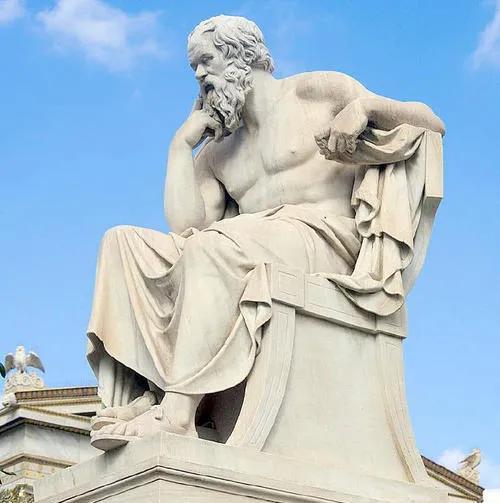Know yourself ~ Socrates
The first thing I remember from Mr. Su was: Know yourself.
This sentence is really powerful, it is the grandfather of the science of philosophy. If you read a few books on philosophy and the like, you will know (Nietzsche Heidegger Schopenhauer and so on), and the core of all philosophy is this sentence, you have to know yourself.
That's why philosophy gets a headache. Every philosopher uses a bunch of obscure words to try to get you to know yourself, and in the end he gets confused or goes crazy (like Nietzsche). It's too hard to know yourself.
I went to what tin university with the company leaders one year, and when I looked at the people sitting on the grass holding their cheeks, I knew that it was a philosophy department without asking, and the men and women were very slender, and they couldn't eat.
Pork knuckles and fried chicken were cheap there, and I bought an elbow and a fried chicken with the idea that I was full and thought about it. Also doing nibbling on the grass, this group of people are staring at me with blue eyes, and when they look at it, they know that I am not philosophical, and I am a foodie.
My fat sister-in-law often scolded me, and the monkeys couldn't see anything. This is the same as what Mr. Su said. The reason why I admire my fat sister-in-law is also here, and her thinking is close to the Su philosophy.
People are like this, look at the shortcomings of others a basket, look at their own advantages two containers, I am also a person, I am also like this, fat sister-in-law said that my is not bad at all.
In 490 B.C., Mr. Su sat in the square of the Acropolis of Athens and debated with a group of people every day about what truth was.
He was the son of a carpenter, and his mother was an obstetrician-gynecologist, called midwife at the time, which was not as elegant as it sounds now. (Ideas are born in the minds of students, and teachers should do things like midwives.) This is the second sentence I remember from Mr. Su, who also advocated heuristics called teaching).
More than four hundred years later, a child was born in the manger of an inn in Bethlehem, Judah, and his father was also a carpenter.
Neither of them was born noble, but their thoughts shone brightly, and they were still very brighter than gamma rays.
According to historical records, during the ancient Greek civilization, the total population of the Athenian city-state exceeded 400,000 people, but the male citizens were only about 60,000, and the number of slaves was close to 200,000.
Socrates was a citizen of Athens, and in his lifetime, in addition to eating and sleeping, his main job was to find people around to debate the question of the soul, and to ask questions and ask questions.
O citizens of Athens, I go around telling you, not only to your flesh, but also to your soul. This is the third sentence I remember.
When I read this, my ears were buzzing, and I remembered it at once, and I still don't forget it.
I will not say much about the situation in Athens at that time, otherwise I would have to write it eight times.
When I was in the company, I wrote a manuscript five times and the boss read it and said it wasn't tasteful enough. As soon as I got angry, I gave him the first draft. As a result, he read it and said good, and after saying good, he asked his secretary to send me the front page of the company's small advertisement, earning more than thirty yuan in manuscript fees, which is the biggest amount of money I have made by code words in my life.
Socrates never wrote a word in his life, but he was an absolutely real shadow and a thorough seeker of thought.
At the age of seventy, in the face of judgment from his spiritual opponents, he did not save his life, and it is estimated that he had annoyed his wife enough.
His last words were: So-and-so, I borrowed a rooster from my fat sister-in-law, and you returned the money for me.
Probably this is the meaning, I forgot the original text. Socrates is very honest, unlike some people now, who owe money and pretend to be uncles.
His eldest brother apprentice Plato's
"Republic" is really well written, and you take the time to buy a book to read.
I will not talk about the benefits of this book, all the same, insomnia medicine.
Virtual bamboo essay
Socrates (469–399 BC)
Plato Plato (427 BC – 347 BC)
